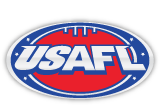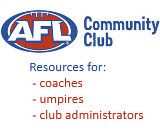BLAST FROM THE PAST - #8
|
|
The worlds beer bureaucrats decided to stage a world competition to determine the worlds best beer. The scene was the Great Exposition in Paris, France, time was 1900 AD. They were hosts to the second modern Olympiad. Favorites, of course, were the Germans. Fosters from Australia entered somewhat naively and with eager promise. As so often happens, the German beer bureaucrats spatted with the French sponsor bureaucrats seriously enough to take their suds back home before a cap had been popped. The Australians won, called themselves Champions of the World and never entered another competition. Or so the story goes.
Fosters did reappear on the world scene. This time championing the fledgling United States Australian Football Association's National Championships in Cincinnati on the 29th and 30th of August, 1998. Their support enabled fifteen clubs to form eight teams which comprised two groups of four. Round robins were played on Saturday and Sunday with the first two in each groups playing semi-finals and a grand final between the two winners. The fifteen clubs covered a wide geographic area of the United States. They consisted of Atlanta, Boston, Chicago, Cincinnati, Indianapolis, Kansas City, Louisville, Milwaukee, Nashville, New York, North Carolina, St. Louis, Santa Cruz, South Carolina, and Tri Cities representing Tennessee and surrounds. They formed eight teams of fourteen players which were selected as follows:
Group 1 - Boston, New York, Southern Raiders, St Louis/Kansas City
Group 2 - Santa Cruz, Nashville, Cincinnati, Chicago/Milwaukee
Everyone who turned up was played in one of those combinations. Biggest contingent was from Boston who numbered in excess of 26 representatives.
Champions in the inaugural season, 1997, from six competing teams were the Cincinnati Dockers, excellent hosts to this 1998 carnival. The Boston Demons Footy Club wrested these honors from the 1998 carnival teams surprising many veteran assemblies with their strength and expertise. Indeed, US Australian Football President, Paul O’Keeffe, commented at the final presentation "This Boston team has come from nowhere." Formed in late 1997, the club has approximately 30 players, mostly Australian and is affiliated with the Melbourne Demons in Australia.
Runners up were the Santa Cruz Roos, who were champions of the west, and whose coach, the storied John Ironmonger, has brought them to prominence in the last two years. New York, sporting the Magpies uniforms, have already locked in with Boston on an important ANZAC day game in April at the Babson College fields just outside of Boston. A feisty group, the Magpies were hoping to make it an all east final, and nearly succeeded in so doing, losing to the Roos in the semi-final by a mere nine points.
The Nashville Kangaroos were established in 1997 and have taken a great interest in the setting up of the constitution for the game in the United States. They also played with great fervor in the initial rounds. The Southern Raiders, who consisted of players from the Tri-City Saints, the Carolina Hawks, and the Washington Eagles, hail from the Tennessee border with North Carolina and Virginia. The Three Cities being Johnson City, Kingsport, and Bristol. They branched from Nashville to form a club that affiliates with St. Kilda in Australia. In this competition they settled under the rubric of the Southern Raiders.
The Cincinnati Dockers, proud holders of the 1997 National Champion honors, was founded in 1996, as one of the original three clubs in the Mid-west (Indianapolis and Louisville were the other two). The St. Louis and Kansas City combination arose from the Kansas City Power which was formed in 1996 and is akin to the Port Power club in Australia, and the St. Louis Blues, formed in 1997, with the support of the legendary Australian club, the Dark Blues of Carlton. The remaining group was the Chicago Mob, formed in June of 1998, and the Milwaukee Bombers, whose first game was against Chicago on June 28, 1998, and who are associated with another very successful Australian team, the Essendon Bombers. The USAFA President, Paul O'Keeffe, is the coach of this new team.
And so the clubs squared off for the Championships. At least one umpire presided over each game, sometimes two. Unique in the game of football generally was the presence of three female umpires who shared their duties with the men. Two adjacent ovals were used, and each game consisted of two twenty minutes halves. A limit of fourteen players was placed on each team. Refreshments were set up on the boundary of the first ground along with two portable toilets. The second ground didn't fare quite so liberally, with a hose from a neighboring yard and considerable forest on each side of the ground enabling players and spectators to gain relief with dignity and decorum, most of the time.
An evening party, sponsored by Fosters, was held at the Sharonville VFW Banquet Hall with barbecued fare and ample fluids produced at the call of a modest cover charge. Some of the teams left early and sober, but all attendees behaved themselves circumspectly. A Commemorative Program was produced and the games were played with verve and contact, and little ill feeling. The umpires employed a send off rule, which they invoked when any of the players argued unnecessarily or foolishly used that universal invective that starts with a "f" and ends with a "k". The liberal provision of ice, water, embalming oils, and first aid materiel ensured the games flowed consistently and safely. The one enduring injury detected from the teams was a fractured arm sustained by USAFA President, Paul O'Keeffe, early on the Saturday.
The Cincinnati organizing team must be praised for there efforts. Gary Flesher and Ruben Gordon led a team of willing volunteers who hosted impeccably. The hotels were fine and the local restaurants obliging. Christie's Rathskeller and Bier Garten proved to be generous in it's main provisions. The grounds were firm. The hosting exemplary, and the umpiring entirely adequate. Readers are referred to the specific team web sites for more details.
The Boston team, consisting of some dedicated ex-patriots and a small number of enthralled Americans, carried the weekend impressively. They raised the bar to a height that will challenge other clubs in future contests. And the other clubs will of course respond. Lethal Giant, John Ironmonger, leader of the much vaunted Santa Cruz team, waved a menacing finger at the boys from Boston as he left the closing dinner. A fierce look in his eyes clearly revealed his plans for 1999. Others will respond likewise.
US Footy is in good shape with the potential for further quantum leaps duly imminent. The subject on the lips of the aficionados watching from Australia relates to two questions: Will Aussie Footy continue as a permanent fixture in the United States and, more importantly, will the standard grow to a point where some degree of parity is reached with the senior groups playing in Australia? US Footy is at these crossroads now. The pundits are laying the odds and the seers are prophesizing variedly, but the informed guess is that Footy is here to stay and when it grows it will spread like wildfire across the face of the US. It is such a great game to watch and play.
- John (Doc) Cheffers
(953)
|
|
|





